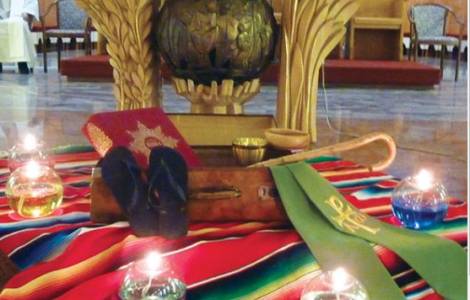
Genoa (Agenzia Fides) - "In 2023 I reported on my experiences in different cities in Italy. After speaking about my experiences as a missionary kidnapped in the Sahel, there was always room for questions from the audience, and many asked: Do you still want to be a missionary after what you have suffered? Will you still go back to Africa? Why not do missionary work here too? In my answer I always point out that 'I am a missionary' and not 'I work as a missionary,'" said Father Pier Luigi Maccalli, priest of the Society of African Missions.
Originally from the Diocese of Crema, Father Gigi, as he is known, served in missionary work in Ivory Coast for several years before coming to the parish of Bomoanga in the Diocese of Niamey, where he spent another decade before being kidnapped by a group of alleged jihadists on 17 September 2018 and released on 8 October 2020.
The missionary, who for has not yet returned to Africa but continues to follow his community in Bomoanga from a distance, stopped to reflect on his constantly evolving missionary nature. "In the collective imagination there is still the idea that mission is doing things, such as hospitals, schools, wells and so on. Mission is therefore still associated with mission areas, which primarily include Africa. However, the Second Vatican Council firmly affirmed: "The Church is missionary by nature" (Ad Gentes No. 2). In other words: The church does not have missions, but rather it is missionary." "It is true that after the Second Vatican Council (1965) the Church went through a period of crisis and rethinking that continues to this day", Father Maccalli continued.
"The missionary institutes themselves questioned the meaning of their specific identity: if we are all missionaries, does it still make sense to say and dedicate ourselves to missions? Pope Paul VI intervened in this debate with Evangeli Nuntiandi (1975) by taking the concept of mission out of the narrowness of proselytism and clarifying it as a witness. The gospel was linked to the advancement of man, and this was a strong inspiration for the missionaries. Afterwards, Pope John Paul II's encyclical Redemptoris Missio (1990) highlighted the importance of dialogue as a structural component of mission. The human, religious and cultural universe is plural and the missionary Church is in dialogue with everyone. With Pope Francis' apostolic exhortation Evangelii Gaudium (2013), the label of first evangelization and new evangelization is finally overcome, and the church is called to be an oasis of mercy and a 'field hospital'. Mission does not impose itself from outside and is not an activity, but a force of love that attracts. So the mission is not over, if at all, rather this applies to the imperial style of proselytizing. On the contrary, a turning point has just begun in the church. Practically from the time of the emperors Constantine (313 AD) and Theodosius (384 AD) until modern times, the Christian religion has enjoyed the privilege of the state religion and has been closely linked to secular power. With the Second Vatican Council (only 60 years ago) a new era began, inspired by the origins of mission as the way of the cross: "And when I am lifted up from the earth, I will draw everyone to myself" (Jn 12.32). "The Apostles and the Christian communities of the beginning bore witness to the appeal of a faith in fragility and poverty of means with a hospitable style during persecution," concludes Father Gigi. “This is the essence of the mission of yesterday and today: universal brotherhood. The mission is by definition unfinished, but the mission month of October gives it a new urgency at the beginning of each church year. We are on a mission and I feel this urgent call within me". (GM/AP) (Agenzia Fides, 21/9/2023)